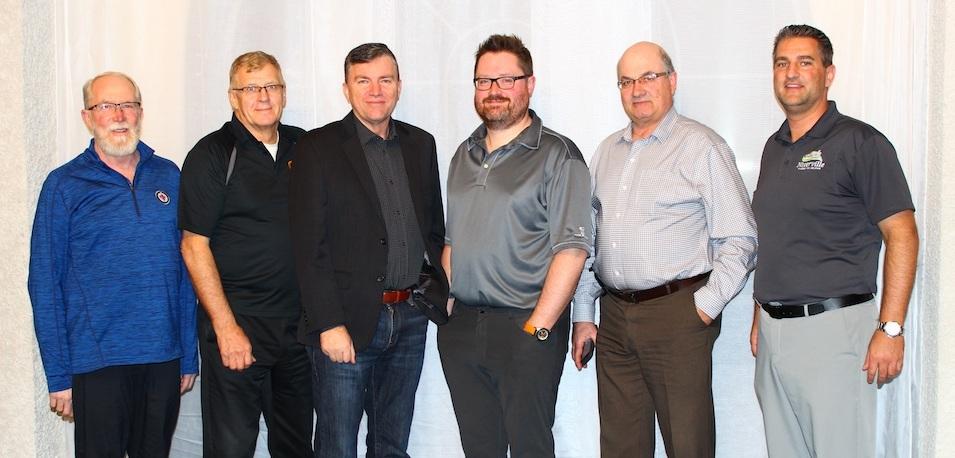At a regular public hearing held on the evening of August 20, Niverville council held a vote regarding the possibility of cannabis retail. The question posed to council members by CAO Eric King queried whether a plebiscite should be held in the Town of Niverville on Tuesday, November 26.
Mirroring the vote held a few weeks ago regarding a conditional use application from Canna Cabana, council’s vote was split. Councillors Kevin Stott and John Funk voted in favour of holding a plebiscite, and councillors Nathan Dueck and Chris Wiebe voted against.
The tie was broken by Mayor Myron Dyck, who voted in favour of holding a plebiscite.
The affirmative vote from council means that residents of Niverville will be faced with a formal opportunity to vote on the following question: “Should licensed retail cannabis stores be allowed in Niverville?”
Since denying Canna Cabana’s application a few weeks earlier, the cannabis retailer had already submitted a second application in the hopes of addressing the concerns council had with their first presentation.
According to council’s understanding of municipal bylaws, a split vote on a conditional use application requires a waiting period of one year before a second application can be addressed. The only way to avoid this is if at least one councillor submits a letter indicating the reasons he feels a majority vote could be reached on the second go. Such a letter needs to be submitted before the next regular public meeting of council.
None of the councillors submitted such a letter.
So council was faced with two options: to wait a year before considering any further cannabis retail applications, or to hold a plebiscite. According to King, these same options would apply to any conditional use application where council’s vote ends in a stalemate.
“We need an answer to this,” Mayor Dyck told those gathered. “I really don’t see how [waiting] a year… could change… two fairly entrenched positions on council, so therefore I would suggest that we should have this plebiscite and the town will have their opportunity to have their say.”
King explains that there is a distinct difference between a plebiscite and a referendum. The results of a plebiscite vote are binding, he says, meaning council is required to honour the public vote without question. A referendum, on the other hand, only provides guidance to council as to their constituents’ general position.
“If you have 50.1 percent one way or the other, that is the way [council will have to go],” says King.
If the majority of residents vote against cannabis retail, the town’s zoning bylaws will need to be changed to reflect that decision.
As well, the only way to reverse a plebiscite decision in the future is to hold another plebiscite down the road. Without referring to The Municipal Act, Kings says he’s not clear on the exact waiting period before the next plebiscite can be held, but he believes it may require a three-year wait period.
That’s not to say a cannabis retail application can’t be denied by council again, even if the majority of residents vote in favour of cannabis retail in the community. A conditional use permit would still be required by Canna Cabana or any other cannabis retailer. Council has the right again to deny any application that doesn’t meet zoning criteria such as parking spaces, signage, hours of operation, etc.
“[A cannabis retailer] would still have to come forward for a conditional use [hearing],” says King. “The question of morality cannot be considered [by council if the community votes in favour].”
As per the Manitoba Elections Act, a plebiscite follows the same criteria as a general election and must be held a minimum of 90 days from council’s decision to hold such a public vote. Unlike a general election, property owners who do not reside in the community will not get a vote.
King says the cost of holding a plebiscite will be an expense born solely by the town. He’s confident that it can be done for under $5,000. He assures residents, though, that plenty of advertising will go out before the official vote. Advance and mobile polls will be made available for residents unable to make it to the voting station on November 26.
At this stage, Canna Cabana is unwilling to comment on whether they are prepared to wait until the November 26 vote or if they will simply choose to withdraw their application and move on.
Bryan Trottier, owner of the building Canna Cabana proposed to lease, says, “In light of this new announcement, we will need to regroup and make a decision that will serve our company best in the future.”
Nick Kuzyk of Canna Cabana says no one from council reached out to them to indicate the reasons for council’s original denial of their application.
“Our primary reaction was one of confusion,” Kuzyk says of the application denial, indicating that they were met with a warm reception by council members right up until the day of the meeting. “We didn’t anticipate this reaction or outcome to our application, especially based on the positivity and success that we’ve experienced in dozens of communities across multiple provinces to date. However, we understand and respect that every community is different and unique.”
Mayor Dyck is hopeful that a resolution to the question of cannabis retail can be achieved on November 26.
“We need to deal with this,” Dyck says. “We have many other things in the community that we need to move forward with. Let’s get a decision on this, let’s live with it, let’s move on.”


